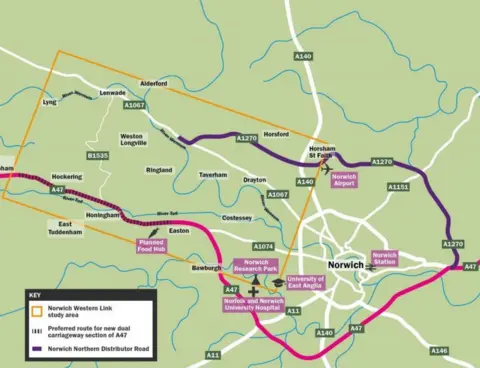Norwich Western link road plan protest held amid bat colony claims
 Andrew Sinclair/BBC
Andrew Sinclair/BBCProtestors have taken their campaign to Whitehall amid new claims a link road would be "catastrophic" for the future of a bat species in the UK.
The 3.9-mile (6.2km) route would connect the Northern Distributor Road (NDR) to the A47, west of Norwich.
Campaigners, who demonstrated outside the Department for Transport, oppose the risk to habitats, including the newly found colony of Barbastelle bats.
The county council has said the road would cut congestion and journey times.
Along with a number of business groups, it has also argued that the road would ease pressure on nearby village which are used as rat-runs.
 Norfolk County Council
Norfolk County CouncilWildlife and environmental organisations, including the Campaign to Protect Rural England, have said the scheme would destroy ancient woodland, meadows and river valleys.
Rachel Watson, 56, of Norwich, was among those protesting outside the government offices on Friday.
"The county council is really ignoring the strength of feeling about this from a lot of different groups and individuals," she said.
"They really should be thinking of alternatives, like widening the existing roads, protecting communities who live along those roads and putting more money into public transport."
Jenn Parkhouse, from Norwich, a member of Extinction Rebellion, claimed the road would "absolutely wreck the Wensum Valley".
"I moved to Norfolk about 30 years ago and in that time I've seen a gradual erosion of the countryside around Norwich," she said.
The demonstration was part of a wider protest about road building and its impact on the government's net zero target.
'Globally threatened'
It came as Norfolk Wildlife Trust claimed independent research had discovered the largest-known and nationally important colony of Barbastelle bats directly on the proposed route.
In a blog post, senior conservation officer Mike Jones said destroying the habitat in the Wensum Valley would be "catastrophic for the future of the species in the UK".
"This species is globally threatened, declining across their whole range in Europe and even going extinct in other European countries such as the Netherlands," he added.
"The bats are highly dependent on the Wensum Valley's ancient landscape, a vast tapestry of old woodlands, meadows and river valleys - they can be found foraging for several miles from their roosts.
"Many of these habitats have taken hundreds of years to mature and once damaged, they cannot be replaced in our lifetime."
The Conservative-run county council is continuing to develop and finalise its planning application following a public consultation.
Opposition parties are opposed to the scheme, the cost of which has been put at £251m.

Find BBC News: East of England on Facebook, Instagram and Twitter. If you have a story suggestion email [email protected]
